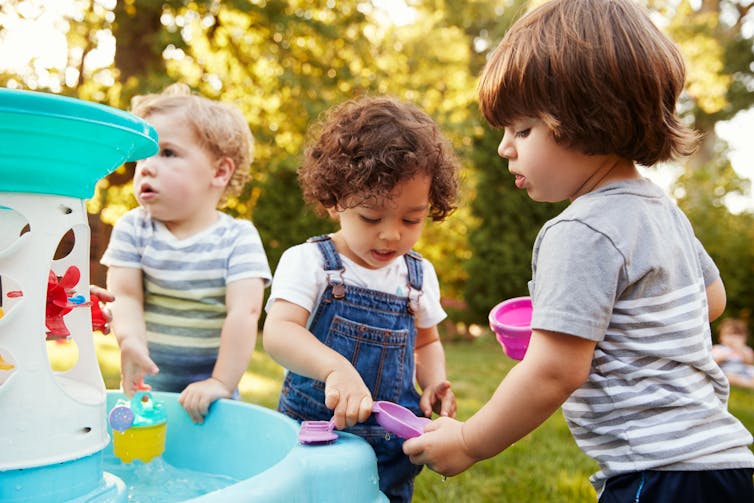Written by Katie Alcock, Lancaster University
Research has found that babies born during lockdown have been later to meet some language and communication milestones. During this time, babies met fewer new people and had fewer chances to socialise with other adults and babies, whether in baby groups or in family and friends’ homes, and parents had work responsibilities while caring for their babies. This may have led to the lag in skills in the 2020 babies.
Parents often worry more about their child not talking than they do about their child not meeting other milestones. Parents are also more accurate in telling researchers when their child should meet talking milestones than other milestones, such as play or gesture.
Many children who are a bit slow to talk but catch up later, and children who are more likely to carry on having language problems are not necessarily the ones who talk late, but the ones who also don’t understand as many words as their peers.
But it’s important to keep a good handle on whether a child is experiencing some delay with communication, as children who have a serious language delay when they start school are more likely to have problems making friends later on. In general, good language skills help children to do well at school.
The best way to help your toddler with their language and communication is to make sure that people talk to them and listen to them, whoever they are coming into contact with.
No ‘right way’ to talk
Parents may feel they aren’t talking to their children in the right way, but research shows there really isn’t a “right way” which will definitely improve your child’s language over a long period of time. Parents from different cultures talk to their children differently, and so far we have found that small changes in talking to toddlers are unlikely to affect a child’s language at school age.
We do know that talking to children about what they are interested in is one of the most effective ways to help the youngest toddlers to learn new words. A controlled trial carried out in the north of England taught some parents to use this type of “contingent talk” – talking about what a child is paying attention to, when they are paying attention to it.
So, for example, parents were taught to say “oh that’s the LORRY you’re playing with, what a fun LORRY” while their child was already paying attention to the lorry. Other parents in the trial were just taught about healthy eating and dental health.

Monkey Business Images/Shutterstock
The researchers made sure that they included families from a wide range of backgrounds, including families in low income areas. The study found that children whose parents were given these tips on talking to their children when their children were just under one year old were saying more words when they were 18 months old than those in families who didn’t get these tips.
But as with previous research, there wasn’t a measurable difference between the two groups of toddlers six months after that. So while it’s good to talk to toddlers, it doesn’t necessarily mean changing the way you talk to them is going to carry forward into their future language skills.
Specific instructions on how to talk to a baby or toddler may also be jarring for parents when they differ from practices from their own culture. Of the babies born in England and Wales in 2020, 30% have a mother who wasn’t born in the UK. Out of those babies, their mother’s most common country of birth was Pakistan. The top ten countries of birth for non-UK-born mothers in 2020 also include Romania, Nigeria, Somalia and India.
We know that parents from different parts of the world use different ways of talking to children and have different ideas on bringing up their children. For example, research has found that parents in Sub-Saharan Africa are more likely to use “instrumental” speech to children – trying to ask them to do something, or pointing out something dangerous near the toddler. In the past, researchers in western settings have mainly studied parents talking to toddlers when they were playing together, focusing on toys and games.
Given how concerned parents of babies born in lockdown might be, the important thing to remember is that however you talk to your toddler now, it’s likely to help them. Whether this is part of a dedicated sit-down play session, getting them to help you with things around the house, or learning to do what adults are doing – it’s all good.![]()
Katie Alcock, Senior Lecturer, Lancaster University
This article is republished from The Conversation under a Creative Commons license. Read the original article.



Recent Comments